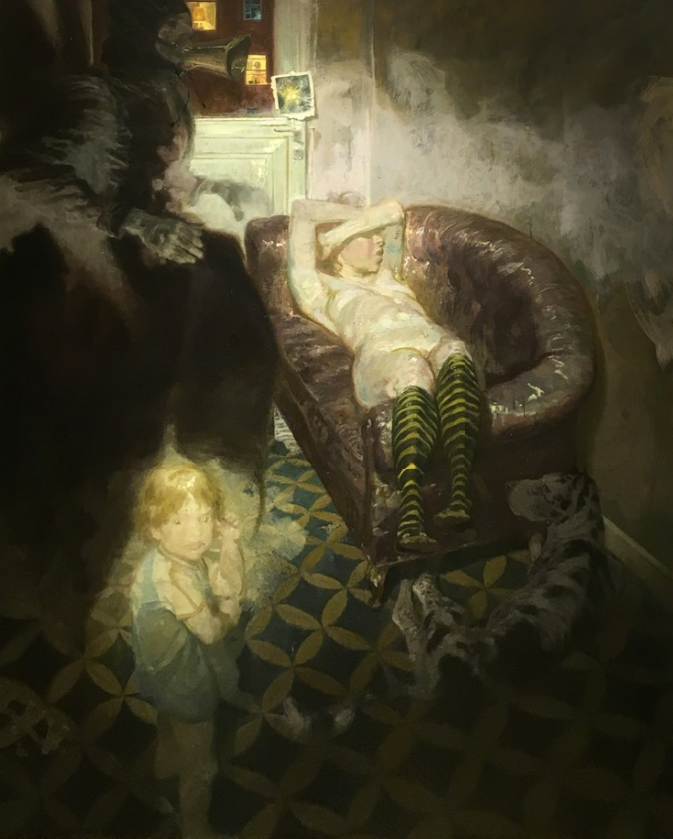The views and opinions, o pin onions, expressed by Alan Moore's Jerusalem do not necessarily reflect the light outside

I know I am a text. I know that you are reading me. This is the biggest difference between us: you do not know you are a text. You don't know that you're reading yourself. What you believe to be the self-determined life you are passing through is actually a book already written that you have become absorbed in, and not for the first time. When this current reading is concluded, when the coffin-lid rear cover is eventually shut tight, then you immediately forget that you've already struggled through it and you pick it up again, perhaps attracted by the striking and heroic picture of yourself that's there on the dust-jacket.
You wade once more through the glossolalia of the novel's opening and that startling birth-scene, all in the first person, foggily described in a confusion of new tastes and scents and terrifying lights. You linger in delight over the childhood passages and savour all the powerfully realised new characters as they are introduced, the mother and the dad, the friends and relatives and enemies, each with their memorable quirks, their singular allure. Engrossing as you find these youthful exploits, you discover that you're merely skimming certain of the later episodes out of sheer boredom, thumbing through the pages of your days, skipping ahead, impatient for the adult content and pornography that you assume to be awaiting you in the next chapter.
When this turns out to be less an unalloyed joy, less abundant than you have anticipated, you feel vaguely cheated and you rail against the author for a time. By then though, all the story's major themes are welling up around you in the yarn, madness and love and loss, destiny and redemption. You begin to understand the true scale of the work, its depth and its ambition, qualities that have escaped you until now. There is a dawning apprehension, a sense that the tale might not be in the category you have previously supposed, that of the picaresque adventure or sex-comedy. Alarmingly, the narrative progresses past the reassuring borderlines of genre into the unnerving territory of the avant-garde. For the first time you wonder if you've bitten off far more than you can chew, embarked on some weighty magnum opus by mistake when you'd intended to pick up only a pot-boiler, holiday reading for the airport or the beach. You start to doubt your capabilities as reader, doubt in your ability to stick this mortal fable out to its conclusion without the attention wandering. And even if you finish it, you doubt that you're astute enough to understand the saga's message, if message there be. You privately suspect that it will sail over your head, and yet what can you do but keep on living, keep turning the calendar-leaf pages, urged on by that cover-blurb that says: "If you read only one book in your life then make it this one."
Not until you're more than halfway through the tome, near the two-thirds mark, do the earlier seemingly random plot points start to make some kind of sense to you. The meanings and the metaphors begin to resonate; the ironies and the motifs reveal themselves. You're still not certain if you've read all this before or not. Some elements seem awfully familiar and you have occasional premonitions as to how one of the subplots will work out. An image or a line of dialogue will sometimes strike a chord of déjà vu, but by and large it all seems like a new experience. It doesn't matter if this is a second or a hundredth reading: it seems fresh to you, and, whether begrudgingly or not, you seem to be enjoying it. You don't want it to end.
But when it is concluded, when the coffin-lid rear cover is eventually shut tight, you immediately forget that you've already struggled through it and you pick it up again, perhaps attracted by the striking and heroic picture of yourself that's there on the dust-jacket. It's the mark of a good book, they say, if you can read it more than once and still find something new each time.
– pp. 773–774 (of 1174), published by Knockabout, 2016, in tiny serif font
an interview with Alan Moore on Radio New Zealand I enjoyed, 17 November 2024:


